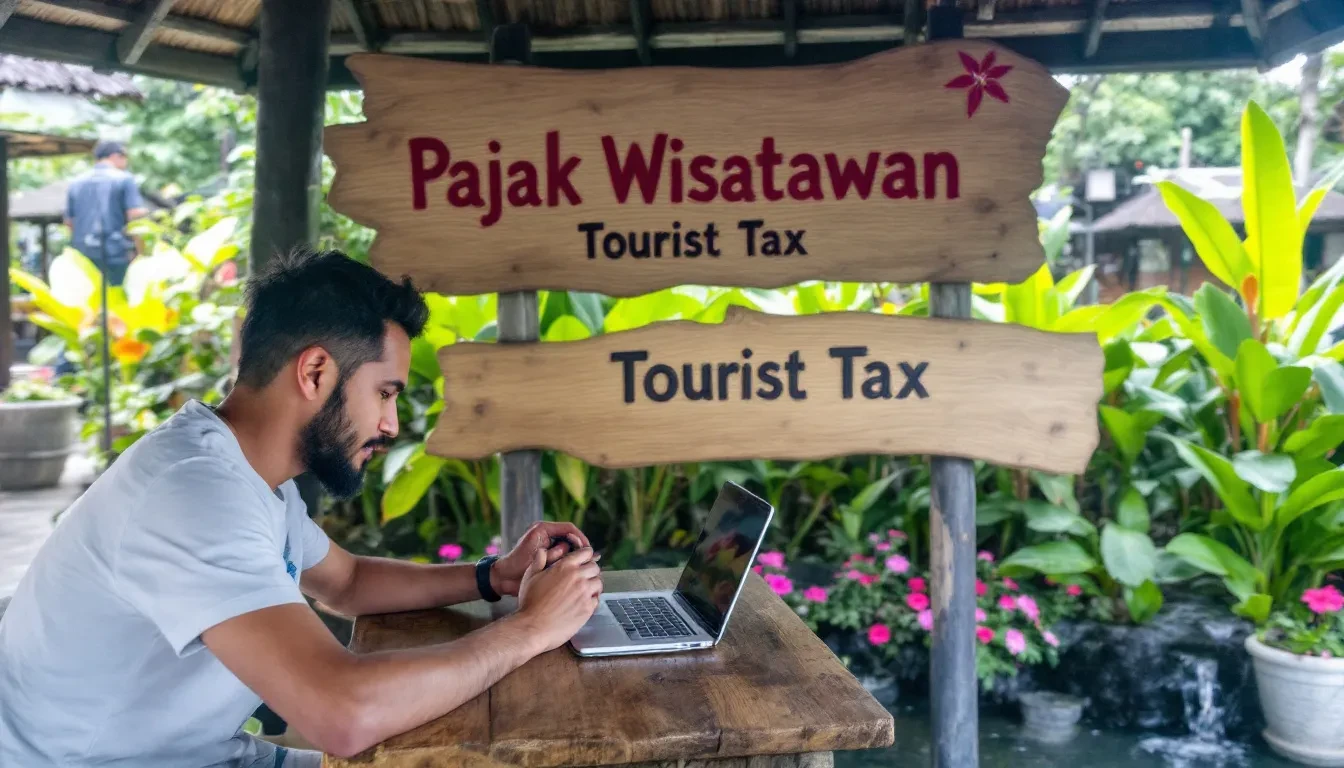Bali Tourist Tax: Essential Details for Your 2025 Trip


Key Takeaways
The Bali Tourist Tax is a new levy for international visitors, costing 150,000 IDR (approximately USD 10), aimed at funding conservation and community initiatives.
Effective from February 14, 2024, all foreign visitors must pay the tax, which can be done online or at the airport, with specific exemptions for certain visa holders.
Revenue from the tax supports environmental conservation, cultural preservation, and local events, ensuring a sustainable tourism model that benefits both visitors and the island’s community.
What is the Bali Tourist Tax?

The Bali tourist tax is a newly implemented tourism levy by the Bali provincial government, aimed at international visitors entering the island. This initiative seeks to fund vital conservation efforts and support environmental initiatives under the Love Bali movement. This measure ensures the preservation of the island’s natural and cultural resources for future generations. The new bali tourist tax also supports infrastructure improvements, housing projects, and destination management, thereby enhancing the overall experience for tourists. The Bali government is committed to these efforts.
Every international visitor, regardless of the length of their stay or age, is required to pay this tax. This comprehensive approach ensures that all who enjoy Bali’s unique culture and stunning landscapes contribute to their upkeep and sustainability.
The Bali Tourist Tax allows visitors to contribute to the community and environment, preserving what makes the island a magical destination.
How much does the Bali Tourist Tax cost?
The cost of the Bali Tourist Tax is set at 150,000 IDR per person. For those opting for the convenience of online payment, an additional fee of 4,500 IDR is applied. This translates to approximately USD 10 or AUD 15, a small price to pay considering the significant benefits it brings to the island.
The tax funds are directed towards essential environmental and cultural preservation efforts, ensuring that Bali remains a beautiful and culturally rich destination for years to come. Visitors’ payments directly support initiatives such as plastic waste management, marine life protection, and local cultural projects.
When did the Bali Tourist Tax come into effect?
The Bali Tourist Tax was officially implemented on February 14, 2024. This date marked a significant step towards sustainable tourism, with the aim of balancing the influx of visitors with the needs of the local environment and community. This tax represents the Bali Provincial Government’s proactive approach to addressing the challenges of mass tourism.
For travelers, understanding this timeline is crucial. Knowing that the tax is now a mandatory part of entering Bali ensures that visitors can prepare adequately, either by paying online before arrival or at the airport upon landing. This foresight helps in avoiding any last-minute surprises and ensures a smoother travel experience.
How to pay the Bali Tourist Tax

Paying the Bali Tourist Tax is straightforward and can be done in two primary ways: online via the Love Bali website or in person at the airport. The online payment method is highly recommended as it allows travelers to complete the process before arriving in Bali, thus saving time and avoiding potential delays at the airport.
For those who prefer or need to pay upon arrival, the Bali Provincial Government has installed payment counters at various entry points, including airports and harbors. This ensures that every visitor has the opportunity to fulfill their obligation conveniently, whether they are tech-savvy or not.
Steps to pay online
To pay the Bali Tourist Tax online, start by visiting the official Love Bali website. Once there, select your preferred currency and payment method, which can include credit cards or other electronic payment options. Next, enter your personal details, such as your name, passport number, and travel dates.
After completing the payment, you will receive a confirmation QR code. This QR code serves as proof of payment and should be presented upon arrival in Bali. This method not only streamlines the payment process but also ensures you are well-prepared before your trip.
Paying at the airport
If you choose to pay the Bali Tourist Tax at the bali airport, you will find designated payment counters upon arrival. These counters are equipped to handle both cash and card payments, providing flexibility for all travelers. Be sure to have your passport and arrival information ready to facilitate a smooth transaction.
Paying at the airport is a convenient option, especially for those who may have missed the opportunity to pay online. However, to avoid queues and potential delays, it’s advisable to complete the payment online if possible.
Who needs to pay the Bali Tourist Tax?

The Bali Tourist Tax applies to all foreign visitors entering Bali, whether they arrive from outside Indonesia or other provinces within the country. This includes travelers on short trips, holidaymakers, and even children. The comprehensive nature of the tax ensures that every international visitor contributes to the island’s upkeep.
However, there are certain exemptions to this rule. Specific visa holders, such as those with KITAP (permanent residency) and diplomatic visas, are not required to pay the tax. This ensures that the tax burden is placed fairly on those visiting for leisure rather than those residing or working on the island.
Visa exemptions
Several categories of visas are exempt from the Bali Tourist Tax. These include diplomatic visas, official visas, non-tourist visas, and long-term resident visas. Individuals traveling for business purposes, long-term stays, or family unification are often covered by these exemptions.
Understanding these exemptions is crucial for certain travelers to ensure they are not caught off guard by the tax requirements. Always check the specifics of your visa and travel purpose to see if you qualify for an exemption.
What happens if you don't pay the Bali Tourist Tax?
Failing to pay the Bali Tourist Tax can lead to serious consequences. Travelers who neglect to pay the tax may be prohibited from entering Bali in the future. This restriction can significantly impact those who plan multiple visits to the island.
Additionally, non-payment can result in difficulties obtaining visas for future travel to Indonesia. Compliance with the tax ensures a hassle-free travel experience and helps maintain good standing with immigration authorities.
How is the Bali Tourist Tax used?

The revenue generated from the Bali Tourist Tax is allocated to various cultural and environmental initiatives. These funds support sustainable tourism by balancing the needs of the environment with the influx of visitors. Projects include plastic waste management, marine life protection, and reforestation efforts.
By contributing to these initiatives, tourists play a vital role in preserving Bali’s natural beauty and cultural heritage. This sustainable approach ensures that future generations can enjoy the same enchanting experiences that draw millions to the island each year.
Environmental initiatives
The Bali Tourist Tax supports numerous environmental projects aimed at preserving the island’s unique natural environment. These initiatives include reforestation efforts, improved waste management systems, and marine life protection programs. Funding these projects helps maintain the ecological balance crucial to Bali’s charm and allure.
These efforts are part of a broader sustainable tourism model that not only enhances the visitor experience but also ensures the longevity of Bali’s natural attractions. Tourists can take pride in knowing their contributions support vital conservation projects.
Cultural preservation
A portion of the Bali Tourist Tax revenue is dedicated to preserving and promoting the island’s rich cultural heritage. This includes funding for programs that celebrate and maintain Balinese traditions, arts, and crafts.
Support for local artisans and cultural exhibitions ensures that traditional crafts continue to thrive. Investing in these cultural initiatives helps safeguard Balinese culture and Bali’s unique culture for future generations to appreciate and enjoy.
Events and activities supported by the Bali Tourist Tax
The Bali Tourist Tax also funds a variety of events and activities that enhance the cultural offerings for visitors. Traditional festivals such as Nyepi Day and the Bali Spirit Festival are supported by the tax, fostering a deeper connection between tourists and the local community. In addition, the tax supports local artisans and cultural exhibitions, ensuring the preservation and celebration of Balinese customs.
These initiatives not only enrich the visitor experience but also strengthen the local economy and community identity.
Traditional festivals
Nyepi Day is one of the traditional festivals supported by the Bali Tourist Tax. This day of silence, reflection, and self-restraint is unique to Bali and offers a profound cultural experience for visitors.
Supporting such festivals through the tourist tax helps maintain these important cultural traditions, ensuring they continue to be a significant part of Bali’s unique culture and heritage.
Local arts and crafts
The Bali Tourist Tax is utilized to support initiatives that enhance the livelihoods of local artisans, helping to preserve their traditional crafts. Cultural initiatives funded by the tax focus on celebrating and maintaining Balinese customs, including local art forms and exhibitions.
These investments ensure that local culture wisdom and craftsmanship are not lost to modernization, providing tourists with genuine and enriching cultural experiences.
Tips for a smooth trip to Bali

For a smooth trip to Bali, consider using a Wise debit card to avoid foreign transaction fees and ensure competitive exchange rates. Carrying cash is advisable as not all establishments accept cards.
Respecting local customs, especially at religious sites, is crucial. Ensure to cover your shoulders and knees when visiting these places. Tipping is appreciated in Bali, although not obligatory; small amounts are always well-received due to the low prices.
Summary
In summary, the Bali Tourist Tax is a vital initiative aimed at preserving Bali’s natural beauty and cultural heritage. By understanding the tax, how to pay it, and its benefits, travelers can contribute positively to the island’s sustainability efforts.
We hope this guide helps you prepare for your trip to Bali, ensuring a smooth and enjoyable experience. Remember, your contributions through the Bali Tourist Tax play a crucial role in maintaining the island’s charm for future visitors. Happy travels!
Frequently Asked Questions
How much does the Bali Tourist Tax cost?
The Bali Tourist Tax is 150,000 IDR per person, plus a 4,500 IDR online payment fee.
When did the Bali Tourist Tax come into effect?
The Bali Tourist Tax came into effect on February 14, 2024.
Who needs to pay the Bali Tourist Tax?
All international visitors to Bali are required to pay the tourist tax, regardless of the length of their stay, including children, although some visa exemptions may apply.
How can I pay the Bali Tourist Tax?
You can conveniently pay the Bali Tourist Tax online through the Love Bali website or in-person at the airport upon your arrival.
What happens if I don't pay the Bali Tourist Tax?
Not paying the Bali Tourist Tax can lead to being barred from entering Bali in the future and may also complicate your visa applications for subsequent visits to Indonesia. It's crucial to settle this obligation to avoid such consequences.